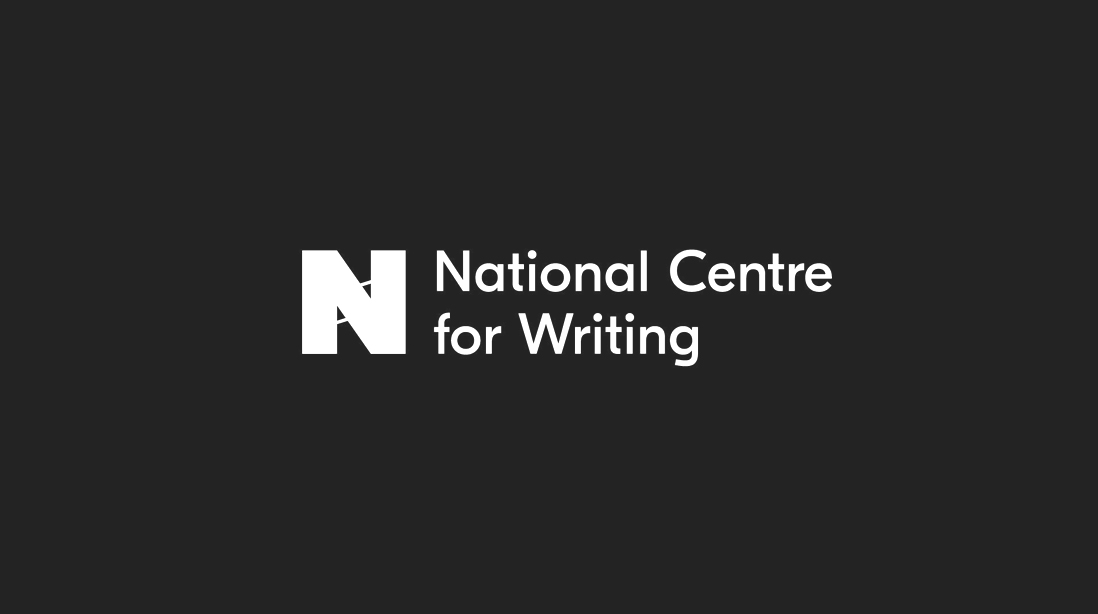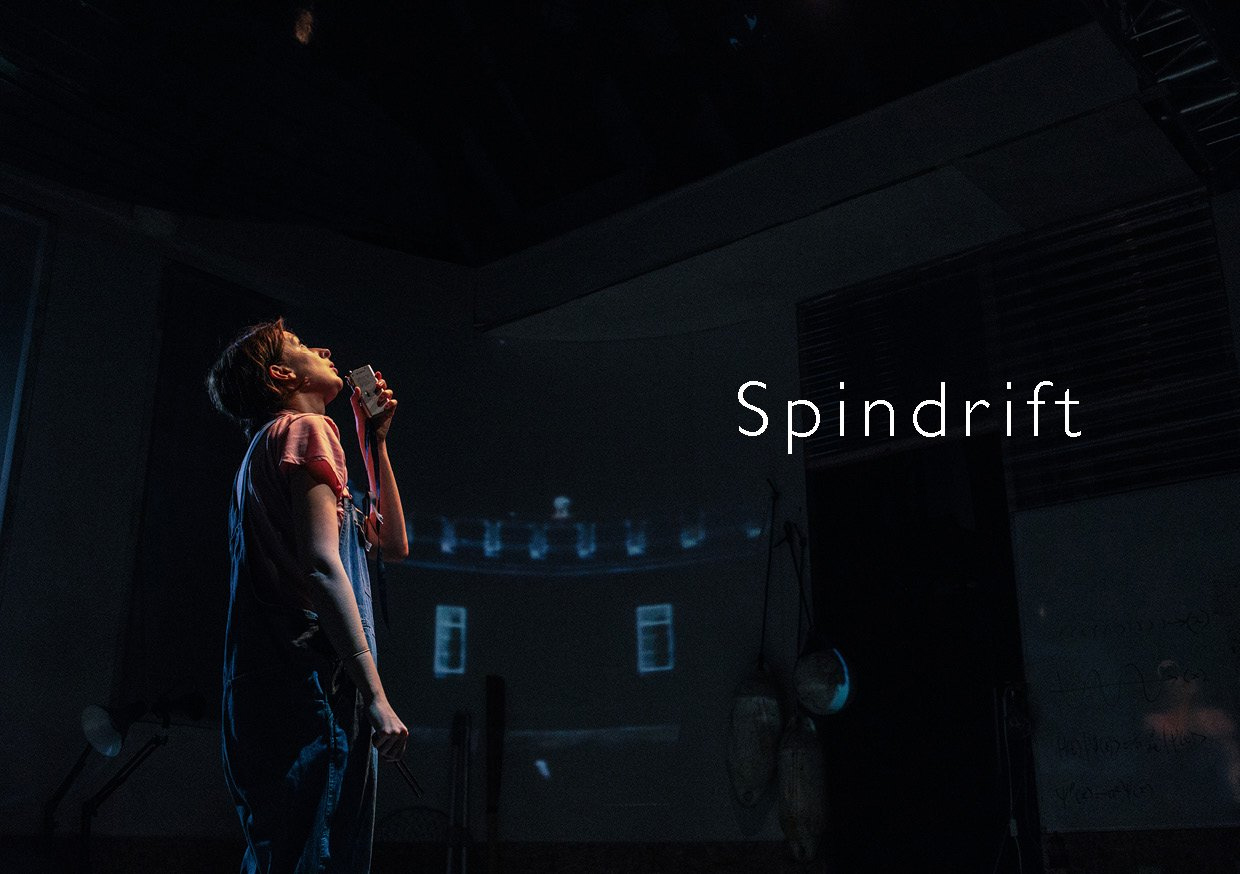4 March 2015. I’m always going to love it when I walk into a theatre and hear the howling guitars of AC/DC turned up – right up – on the sound system, as I did when I entered the Cambridge Junction to see Grounded by award-winning playwright George Brant last week. It transpired that the show rocked pretty hard on a lot of different levels, from start to finish. It was produced by the Gate Theatre and directed by Christopher Haydon, and it has been touring the UK after a Fringe First Award at Edinburgh and the Best Production Award in the Off West End Awards two years ago. The play will be produced next year on Broadway, starring Anne Hathaway. The writing is so rich, and the direction and performance so fine, that endless important nuances rise up off this show like steam.
The story is about an American woman jet fighter pilot, played brilliantly by Lucy Ellinson, who falls in love, gets pregnant, is grounded from flight duty as a result, and begins ‘flying’ remote-controlled drone bombers from a chair in a military office in Las Vegas. It’s a one-actor piece – a single, long monologue that shows her character’s transformation from the blunt, adopted machismo and raw arrogance of an unquestioning military cog into a fully human, fully woman system of interlocking, complex, tender emotions, drives and instincts – instincts which increasingly sound alarm bells at the missions she is asked to perform ‘for her country’. The play explores what it means to be a woman, a soldier, a hero; and it importantly and deftly unpacks the issues around the disturbing trends in modern warfare: unending, morally questionable military actions in deserts (which governments are slyly using as justification for a disturbing erosion of basic human rights, reflected in situations of prisoner abuse and civilian surveillance) and capriciously spun rationales for killing people, while covering the whole business with a sham façade of righteousness.
As I take my seat, I look at the stage set: it is a mesh cube with aqua/blue light cast on it. Inside, The Pilot stands at a casual ease in a khaki flight suit, a little blurry behind the mesh. There is no obvious door to the cube; she just appears encased in it. She has short blonde hair, and her thumbs are hooked in her belt as she watches the audience fill the theatre. AC/DC finish, and ‘Painkiller’ by Judas Priest starts. Her chin is up, and she looks proud and calm. The ceiling of the cube is covered with a proliferation of spotlights hinged at wild angles, or perhaps they are cameras. Throughout the piece the light projections on the cube change it different colours, creating different atmospheres, showing us more or less of the woman inside.
The play begins, and the language is lush and descriptive, so that the Pilot’s world comes completely to life around us in the theatre: in her description of the power and freedom of flying a jet plane, she says ‘you are the blue’, and I felt like I was in the sky. There is a lot of swearing, the sort of profanity adopted as a norm by American male power clusters to shock and entertain. It is entertaining for us, too, but serves the important theatrical function of evoking the strange, Top Gun world the Pilot lives in. And it reveals the underlying tremors in the Pilot’s character – the tremors of a woman’s innate power jockeying uncomfortably into a male space, in disguise. She says confidently of her new baby girl, ‘She won’t be a hair tosser, a needy sack of shit’, which is jarring, and interesting – it is her new mother’s rush of intense pride crushed into the strange, profane idiom of the (male-dominated) American military. Lucy’s body movement is tuned to this male swagger pitch too, to start with. But then things change when she meets a man who surprises her, who accidentally impregnates her, who loves her. Through each revolution deeper into the relationship with him and her little girl, the play repeats a refrain: she says, ‘I feel things shift again’. It’s a beautifully open phrase – it’s gentle and unspecified, and in its ambiguity reflects the strange and wondrous movement of the psyche as we change; and in these moments, her falsely adopted maleness and militariness fall away more and more.
I knew that the play was going to be about a woman fighter pilot, so I came to the theatre expecting to see an exploration of femininity and the way it is contained, suppressed, and mangled in order to do a traditionally male job – to fly, and to fly powerfully – and the show does that, and it is fascinating. But I didn’t realise where Grounded was ultimately going – far, far beyond feminism, as important as that is. After The Pilot has her baby and goes back to work for the military, she is reassigned to drone flights, which she ‘flies’ from a dark, air-conditioned trailer on a military base outside of Las Vegas. The drone planes are called ‘Reapers’. She goes home every night to her husband and little girl, and during the day she is assigned drone missions. A voice in her headphones decides on targets and instructs her to drop bombs on them. The sensitive cameras feeding her the footage from the plane show her the exploding body parts of her targets. The voice in her headphone represents an unseen committee of decision makers above her, which judge any ‘military age men’ travelling anywhere near the path of an American military vehicle as ‘guilty’, and therefore a ‘target’. She says, ‘It should be announced – if you live in the desert, and you step outside, you are guilty.’
The thing that disturbed me the most about this was the imposition of guilt from such an unreasonable distance – a distance that makes impossible a lawful gathering of important information centred around the question, ‘should this person die?’ There was a video-game feel to the removal of large questions of life, death and law from the tiny joystick action she takes, a sense of childishness infused into war, and of humanity slipping backwards into savagery. And in the wider frame, in the power structures higher up than the voice in her headphones, in her military commanders, her government, there was a similar sense of slipperiness of motive. These ‘wars’ seem to have to do more with military and political greed and power than any genuine social or humanitarian concern – and it was disturbing to see in this piece of theatre the individual injustices playing out within this already questionable frame: civilian lives ended without an investigated context or appropriate justification. Because surely that is the most important question to be asked about war: Why this war? What justifies this loss of life? What is it about this conflict that necessitates the taking of lives?
The significance dripped slowly into me at first, as the play started circling these questions. The Pilot begins as a character feeling like a good soldier, a hero, for undertaking these missions ‘for her country’. And then the cracks appear – she knows that the voice in her headset doesn’t really know whether the targets are innocent or guilty. And then her mind riffs on this question of who is guilty, who deserves to die, and why. And then she begins to go mad, as her innate humanity rises up through the questions, through her love for her daughter, and she begins planting empty Diet Coke bottles in the Nevada desert soil on her way home every night, to mark graves for the people she kills. And then one day, she is instructed to kill a target who is holding a little girl like her daughter, and instead she crashes the $11 million dollar plane. A second drone hovering above her plane drops a bomb anyway, and she says, ‘They kill my daughter – her legs and arms fly in different directions’, and this line reflects the sanity inherent in her supposed insanity, with one reality overlaying another in a supremely human understanding that arrives with motherhood: all children are our children. And then her mesh cube is a military jail cell and she is walled up and shouting:
‘You who have slaughtered my child! Who seal me in a tomb, away from my husband, my blue! You, who seal me in a tomb and think you are safe! Know this – know that you are not safe! Know that you can keep me here forever; you can keep me in a bunker of gray! But that does not protect you, for one day it will be your turn! Your child’s turn! And yea, though you mark every door with blood, none of the guilty will be spared!’
And suddenly she is Antigone, the inspiratrice of revolution; she is a new Antigone for our age and our questions. Antigone, in Sophocles’ famous play, was walled up alive by Creon, the ruler of Thebes, as a punishment for breaking a Theban law, which she does in order to honour a higher spiritual law. The conflict in both plays represents a clash of law against law, asking us to question where laws come from, why they are made and which laws are truly just. And both plays honour a deeply felt sense of the natural – the natural urge to protect life, to respect truth, to search out the truth amongst the complexities of life.
In the case of drone warfare, the legal situation is incredibly, uncomfortably murky. Geoffrey Robertson QC, who has written a full legal analysis of drone warfare in the fourth edition of his book Crimes Against Humanity, writing in the New Statesman 13/6/12, notes that ‘the Fifth Amendment to the US Constitution protects, “any person (not just US citizens) from being deprived of life…without due process of law.”’ He explains that
‘Until 9/11, the legal position was clear: in war, active combatants could kill and be killed, subject to rules governing surrender, use of banned weapons, etc. But “war law” applied only to conflicts between armed forces of opposing states, invoking the right of self-defence. Confrontations with insurgents, rioters and terrorists were governed by human rights law, which requires state use of force against serious criminals to be reasonable in the circumstances. This is more restrictive – after three IRA bombers were shot dead on Gibraltar in 1988, the European Court held that the UK had denied them the right to life because MI5 had jumped to mistaken conclusions. In the case of known members of terrorist organisations, the “reasonable force” requirement exercises a necessary and humane restraint over the trigger-happiness of “special forces” and drone targeters. This is why the US, Russia and Israel pretend they are bound only by the law of war, which allows suspects to be killed without much compunction.’
Before I saw this show, I had, obviously, heard the phrase ‘drone flights’, and I had heard statements like ‘drone flights kill x hundred civilians in US war zones every year’ somewhere in the carousel of media that constantly spins around us. But this show connected the dots for me, step by step, in a subtle, breathtakingly artistic process that mapped an element of tragic, inhuman insanity that has become politically normalised.
As I look back at the show, I wonder about the theatre itself, about the voice of The Pilot, our modern Antigone, shouting out from a cube inside a theatre. And the voice to me at first seems so small, female, coming from inside ‘just a piece of theatre’, inside my memory, and makes me wonder how far it can echo, or exert force against the prevailing political edifices. It feels like the voice of theatre, or art itself, shouting ‘NO! NO!’ to politics, to the stupidity of war, greed, and power games. When I thought about this first, I have to admit that in my psyche, there was a sad sinking feeling, a threatening sense of futility…but then the idea of the truth rose up, and I remembered that Antigone is a 2,000 year old play, a piece of theatre that has stayed alive, and travelled from mind to mind, age to age, culture to culture, preciously guarded and taught, because it says something true and important about humanity: that sometimes people need to rise up against the government, to protest the way laws are used or broken, and that that action is heroic. And so here she was again. And now here I am, writing about it, sending the echo of the play farther along. Because the play made me feel so deeply. It made me feel deeply fucking angry at the broken government.





